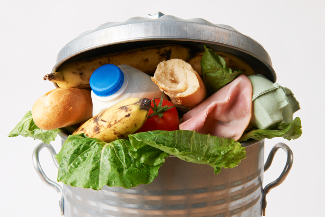Member State Page : Bulgaria
Last updated on the 29/09/2023

Per capita: 86 kg in 2020
In total: 596 844 tonnes in 2020
In total: 711 844 tonnes in 2021

Primary production: 228 472 tonnes in 2020 | Processing and manufacturing: 156 435 tonnes in 2020
Retail and other distribution of food: 15 708 tonnes in 2020
Restaurants and food services: 14 375 tonnes in 2020
Households: 181 854 tonnes in 2020

National targets: 50% reduction of food waste by 2030 | 25% reduction of food waste by 2026
Contact point
- Ministry of Agriculture, Food and Forestry
- Ministry of Environment and Waters
- National Statistical Institute
- Bulgarian Food Safety Agency
Target
Bulgaria is committed to meeting the Sustainable Development Goal Target 12.3 to halve per capita food waste at the retail and consumer level by 2030, and reduce food losses along the food production and supply chains. The national programme for the prevention and reduction of food waste (20221-2026) also sets an intermediary target to reduce food waste by 25% by 2026.
Measure
The Ministry of Agriculture, Food and Forestry, the Ministry of Environment and Waters and the National Statistical Institute share the responsibility of monitoring national food waste levels.
The national climate change adaptation strategy and action plan address the vulnerabilities of the agricultural sector due to climate change, including food losses.
Act
The Ministry of Agriculture, Food and Forestry, the Ministry of Environment and Waters, the National Statistical Institute and the Bulgarian Food Safety Agency share the responsibility for handling the food waste file at national level.
National Plan on Waste Management (2021-2028) was adopted in 2021 including a food waste prevention program.
A draft national programme for the prevention and reduction of food waste (2021-2026) has been put together by an inter-institutional working group, which included ministries, agencies, branch organizations and associations in the food sector, as well as food banks. The national programme is accompanied by an action plan that sets the deadlines for implementation, as well as the responsible institutions.
The National programme was adopted by Decision № 700 of the Council of Ministers of October 7, 2021.
The operational objectives of the national programme are to:
- establish a national database for food waste data;
- support food production, processing and distribution facilities to prevent and reduce food waste;
- change consumer behaviour and attitudes towards food;
- implement food loss and waste prevention measures at all stages of the food supply chain;
- improve the redistribution of surplus edible food for human consumption, to people in need.
The national programme prioritizes prevention of food loss and waste at source and the redistribution of surplus food for human consumption. The Bulgarian Food Law lays down the general requirements for food redistribution activities. An Ordinance on the specific requirements for food banks and for controlling their activity was adopted in 2021.
Action plan of the national programme includes actions to encourage food business operators to employ 'use by' and 'best before' date marking correctly. Awareness raising activities are a key action strand of the national programme, with actions to increase consumer understanding of the meaning of date marking, to promote the consumption of fruit and vegetables that do not meet cosmetic standards, to develop educational materials on food waste for teachers and students.
Bulgaria aims to establish a National Platform on Food Loss and Waste, gathering all actors across the food supply chain and public authorities, to cooperate on a voluntary basis and to help implement the national programme. Members will be asked to adhere to a Memorandum of Cooperation.
In the context of a pilot project for primary school (2019-2020), experts from the Bulgarian Food Safety Agency offered trainings on food waste prevention at home and at school to 3rd and 4th grade students. Unfortunatelly, the project was disrupted due to the Covid-19 pandemic and the virtual format of classes.
Fourth Round table on “Sustainable food consumption in Bulgaria” was held in the University of National and World Economy in September 2021 with the financial support provided by the University of National and World Economy – Sofia with project “Sustainable food consumption in Bulgaria” (NID-NF-18/2021). Experts from institutions, academia, NGOs and business presented their opinions on sustainability of food system, provision of healthy and safe food, reduction of food waste, policies and legislation on enforcement of sustainable food consumption practices in Bulgaria.
University of Food Technologies in Plovdiv, in cooperation with CROSS-KIC EIT REGIONAL EXECUTIVE ACADEMY in Bulgaria organized 2-days online workshop in December 2021 covering some of the current topics: Farm to Fork Strategy, Circular Economy, Prevention and reduction of food loss, Redistribution of food. Useful exchange of knowledge and up-to-date information took place, good practices were presented.
